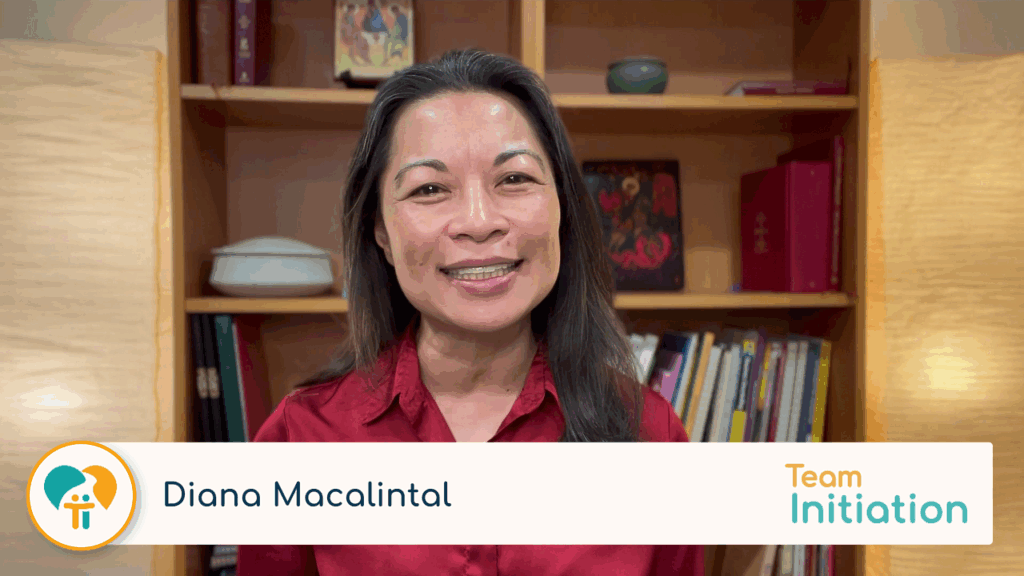
Advent is a good time to think about the dignity and meaning of names. The stories of Advent remind us that names hold deep meaning: Jesus was named by the angel before his birth (Luke 1:31), John was named by Zechariah after he regained his speech (Luke 1:13, 63-64), and Elizabeth and Mary recognized each other through the children in their wombs (Luke 1:41-45).
As we accompany our catechumens and candidates on their journey of faith, we may want to rethink the practice of asking them to choose a baptismal or confirmation name. The teaching of the church and the vision embedded in the rites of the church is that we honor the sacredness of the names given to them by their parents at birth.
The history of renaming
Scripture contains many stories of God renaming people—Abram became Abraham, Sarai became Sarah, Jacob became Israel. Changing one’s name signified a new identity and mission. In the early church, new Christians were sometimes given new baptismal names to signify their rebirth in Christ. Over time, even Christians who were baptized as infants acquired “confirmation names” when they came of age. Multiple saint names became commonplace. I have three, for example.
The 1983 Code of Canon Law simply requires that baptismal names not “be foreign to a Christian mentality” (Can 855). A person does not need to have a “saint name” for baptism. In the current translation of the Rite of Christian Initiation of Adults, the U.S. bishops specifically reject renaming catechumens and candidates (see RCIA 33.4). We do not have the final translation of the revised rite yet, but it is likely that directive will remain unchanged.
Advent is a great time to contemplate the awesome meaning of names. As we accompany our catechumens and candidates, part of our role is to help them find the sacred meaning within the name they have had all their lives.
Likewise, there is nothing in the Order of Confirmation that requires taking on a new name. While it is a common practice in some parishes for confirmation candidates to choose a new name, the deeper tradition of the church is that a person is confirmed under the same name with which they were baptized, thereby symbolizing the close link between the two sacraments.
Church teaching upholds the dignity and sacredness of our given name at birth, and the presumption is we would be baptized and confirmed with that name:
God calls each one by name. Everyone’s name is sacred. The name is the icon of the person. It demands respect as a sign of the dignity of the one who bears it.
Catechism of the Catholic Church, 2158
Honoring given names
A person’s given name is usually a core part of their identity, dignity, and story. Requesting they change their name or add on another could communicate that their original name was somehow deficient. Additionally, many come from cultures that ascribe deep meaning to given names. Using another name for baptism or confirmation could be seen as denying their familial heritage.
Of course, if an individual expresses desire to take a baptismal or confirmation name of their own accord, it would make sense pastorally to honor that request. But in an ideal world, the motivation for choosing a new name would come from the individual and not because catechists or pastoral leaders indicated that is the tradition or norm of the church. It is not.
Rather than introduce name changes during adult initiation, our call is to honor and celebrate the profound meaning already inherent in our catechumens’ and candidates’ given names. We can highlight the saintly figures they may not realize correspond to those names. We can draw parallels with their spiritual journeys. We can bless the familial and cultural connections wrapped up in those names. And most importantly, we can remind them that God has called them by name—the name they are known by—into a deeper relationship in Christ Jesus.
Advent is a great time to contemplate the awesome meaning of names. As we accompany our catechumens and candidates, part of our role is to help them find the sacred meaning within the name they have had all their lives. It is that name by which God has called them into deeper communion with Jesus Christ.
Can you help me out?
I’d love to know how this is landing. Can you share a word or a phrase about how this article resonates with you? Does it speak to your experience? Share your thoughts in the comments box below. Thanks for being part of the conversion!


















I am surprised and rather shocked by this information. I’ve never heard that the church is specifically against catechumens and candidates taking a saint name for confirmation. In fact, when I went through RCIA in 1998, I was not asked about it at all, but when I was older I was asked who my confirmation saint was. Not having one, I felt like I missed out both on valuable knowledge of the saints and particularly the intercession of that saint in my many years since RCIA. I picked St Therese to walk with me in my faith journey at that time, but I lost out on 10+ years of growing and imitating her little way, because I didn’t know about it sooner.
Our RCIA program has not been asking students to pick saint names either because it had been overlooked. We were planning to add that this year but now I’m questioning that as apparently that is discouraged. I will check it out in the RCIA book where you referenced.
Either way, I will still encourage our candidates and catechumens to learn about the saints and pick some to learn about and grow on their faith journey with. Thanks for the article.
Hi Jenni. Thank you for commenting on the article. I hope I wasn’t saying the church is specifically against choosing a saint name for confirmation. I meant to say it is not part of our deeper tradition. Perhaps a more positive way to express the tradition is to say the church is for emphasizing the sacredness of our given names, and the church is for emphasizing the link between baptism and confirmation by celebrating both sacraments under the name we were given at birth. We can always ask a particular saint to guide us and watch over us even if we haven’t taken that saint’s name. For example, I often call upon and try to emulate John the Baptist and Our Lady of Guadalupe, even though I am not named after either of them. I think your goal to encourage your candidates and catechumens to learn about the saints and pick some to learn about and grow on their faith journey with is excellent. Thank you again for sharing.
We do not introduce the topic of baptismal or confirmation names; however if someone raises the question we explain and will honor their desire if they choose a saint whom they see as a model for their future life in the faith. I appreciate the richer explanation in this article and will incorporate these thoughts when the question arises.
Hi Richard. Thanks for your thoughts on this. And thanks for your commitment to this ministry. Blessings.
I’ve been saying this for decades-thank you!
Thanks Mel!
There has been a constant battle in our diocese against parishes, priests, and sometimes, even bishops insisting on a new name around Confirmation, both for those participating in the RCIA journey, and for those who were baptised as infants are coming to the celebration of Confirmation itself.
I’ve always maintained that unless one was going to go to the court house and change your name legally, what was the point of taking a new name. It’s also the reason why I prefer to be addressed by my baptismal name rather than by a title – my baptismal name, given to me by my parents, is the name by which God knows me!
Thanks Andrew! I appreciate your comments. Blessings on your ministry.
thank you for this information. As an RCIA director I have not pushed the idea of adding a saint’s name at Confirmation much less Baptism. Having a patron saint that one chooses to emulate does not have to be a part of a sacrament and can simply be a dear friend who you have a special connection with and can learn from. In fact why limit yourself to just one patron saint?